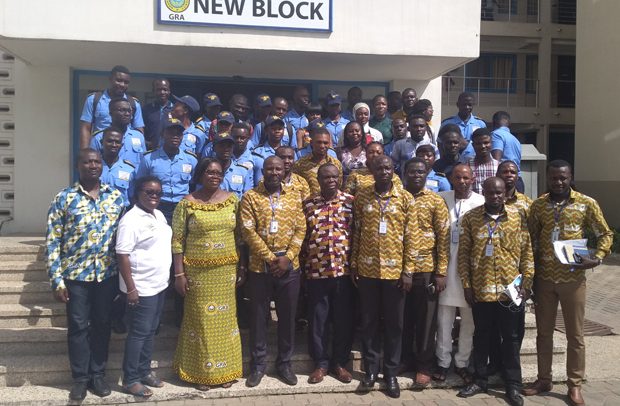A group photograph of NABCO officials and trainees with GRA staff
The Chief Executive Officer (CEO) of the Nation Builders Corps (NABCO) Dr. Anyars Ibrahim has said he is commencing investigation into the issue of compulsory charges imposed on trainees at district level for the sewing of NABCO cloth.
He made it clear that the NABCO cloths are for free and insisted that no trainees should be made to pay for it since the government had spent over GH¢12 million to procure the customised fabric.
Per directives of NABCO, trainees are to wear the cloth on Mondays and Fridays.
Daily Guide however gathered that reluctance on the part of some trainees to abide by the regulations has allegedly compelled some district coordinators to adopt various mechanisms to make trainees wear the uniform.
These mechanisms include the provision of already sewn attire to trainees at a fee of GH¢30 to GH¢35 and the deliberate delay in endorsing and process of time sheet of trainees who fail to make the payment.
Speaking after a tour in the Greater Accra Region, Dr Anyars advised trainees to abide by the directives and make proficient use of the cloth so as to promote the NABCO brand since it was a relatively new organisation.
Dr. Anyars has so far visited six regions in a three week period where he engaged heads of various institutions, trainees as well as NABCO regional and district coordinators.
Last Friday the NABCO Boss visited trainees at the Accra Metropolitan Assembly (AMA), Customs yard at Airport, Customs Divisional Headquaters of the Ghana Revenue Authority (GRA) and the Ablekuma North Municipal Assembly.
He encouraged the trainees to among other things, “be appreciative of the NABCO initiative by giving off your best, go through laid down channels to resolve grievances and to also see your current positions as an opportunity to gain requisite experience which will propel you to have better opportunities.”
The Assist Commissioner of Preventive (ACP) at the Customs Division of GRA, Habib Osman expressed the desire of his agency to retain a chunk of trainees at the end of the training period since most have exhibited high commitment to duty.
“They are ready to learn and carry out any assignment given to them. We on our part will continue to monitor them in order to identify the good materials among them” he said.
By Issah Mohammed


